Thesaurus : Doctrine
Référence Complète : Europe Economics, Etat des lieux et perspectives des programmes de conformité, Etude réalisée pour le Conseil de la Concurrence, 2008.
Thesaurus : 07. Cours d'appel
Référence : Grenoble, 5 nov. 2020, I.D. c/ Société Corin France
Feb. 26, 2025
Thesaurus : Doctrine
► Référence complète : L. Gamet, "Théorie et pratique du droit du travail", Etude, Droit social, 2025.
____
🦉Cet article est accessible en texte intégral pour les personnes inscrites aux enseignements de la Professeure Marie-Anne Frison-Roche
________
Sept. 19, 2024
Editorial responsibilities : Direction of the collection "Cours-Série Droit privé", Editions Dalloz (33)
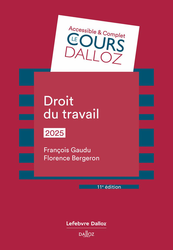
► Référence complète : F. Gaudu & F. Bergeron-Canut, Droit du travail 2025, Dalloz, coll. "Cours Dalloz-Série Droit privé", 11ième éd., 2024, 720 p.
____
► Présentation de l'ouvrage : Ce manuel à jour des derniers textes s'adresse à tous les étudiants en droit et à tous les praticiens qui actualisent leurs connaissances.
Il développe dans une première partie les " relations individuelles de travail " (formation du rapport contractuel, exécution et rupture du contrat de travail), pour consacrer sa seconde partie aux " relations collectives de travail ", (conflits collectifs du travail, représentation et la négociation collective et convention collective de travail).
____
📚Consulter l'ensemble de la collection dans laquelle l'ouvrage est publié
____
📚Sont directement corrélés à cet ouvrage :
🕴️F. Kessler, 📕Droit de la protection sociale
🕴️V. Magnier, 📕Droit des sociétés
________
May 18, 2024
Newsletter MAFR - Law, Compliance, Regulation
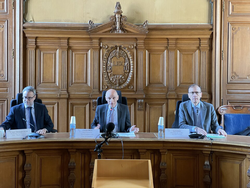
🌐follow Marie-Anne Frison-Roche on LinkedIn
🌐subscribe to the Newsletter MAFR Regulation, Compliance, Law
____
► Full Reference: M.-A. Frison-Roche, "Vigilance / sustainability due diligence (CSDD): new field of Systemic Litigation, crossroads of different branches of Law, notably contracts", Newsletter MAFR Law, Compliance, Regulation, April 30, 2024
____
📧Read by freely subscribing other news of the Newsletter MAFR - Law, Compliance, Regulation
____
🧱Vigilance as Systemic Litigation: when Contracts are everywhere
In this conference-debate on 26 April 2024, the systemic litigation that are emerging in vigilance (duediligence), the latest developments in Compliance Law, and the solutions that can be found, were examined by the speakers, and discussed by the audience.
One of the entry points to this Emerging Systemic Litigation is the contract, which is how the enterprise, encouraged by the soft law of the regulators and international organisations, implements its legal obligation. The judge will be confronted with new questions in this new type of litigation, a consequence of this new branch of Law, Compliance Law.
François Ancel, Jean-Christophe Roda and Cyril Cosme have spoken on what is going to happen.
____
📧read the article published on 18 May 2024 on this topic in the Newsletter MAFR - Law, Compliance, Regulation ⤵️

April 26, 2024
Organization of scientific events
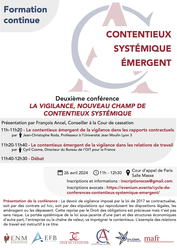
► Full Reference: La vigilance, nouveau champ de contentieux systémique (Vigilance, new field of Systemic Ligation), in cycle of conference-debates "Contentieux Systémique Émergent" ("Emerging Systemic Litigation"), organised on the initiative of the Cour d'appel de Paris (Paris Cour of Appeal), with the Cour de cassation (French Court of cassation), the Cour d'appel de Versailles (Versailles Court of Appeal), the École nationale de la magistrature - ENM (French National School for the Judiciary) and the École de formation des barreaux du ressort de la Cour d'appel de Paris - EFB (Paris Bar School), under the scientific direction of Marie-Anne Frison-Roche, 26 April 2024, 11am.-12.30am., Cour d'appel de Paris, Massé courtroom
____
🧮see the full programme of the cycle Contentieux Systémique Émergent (Emerging Systemic Litigation)
____
🌐see on LinkedIn the report of this event
____
🧱read below the report of this event⤵️
____
► Presentation of the conference: The duty of vigilance imposed by the 2017 French law is being contractualised, either by ad hoc contracts or by stipulations that reproduce the legal provisions, adjust them or go beyond them. This adoption by the Contract and Tort Law is valuable but not without risk. The systemic scope of the underlying law on the one hand and of economic structures on the other, the firm or the value chain, will permeate litigation. The example of labour relations is instructive in this respect.
____
🧮Programme of this event:
Second conference-debate
LA VIGILANCE, NOUVEAU CHAMP DE CONTENTIEUX SYSTÉMIQUE
(VIGILANCE, NEW FIELD OF SYSTEMIC LITIGATION)
Paris Court of Appeal, Massé courtroom
General presentation of the topic and moderation by 🕴️François Ancel, Judge at the Première Chambre civile de la Cour de cassation (First Civil Chamber of the French Court of cassation)
🕰️11am.-11.20am. 🎤Le contentieux émergent de la Vigilance dans les rapports contractuels (Emerging Vigilance Litigation in Contractual Relationships), by 🕴️Jean-Christophe Roda, Full Professor at Jean-Moulin Lyon 3 University
🕰️11.20am.-11.40am. 🎤Le contentieux émergent de la Vigilance dans les relations de travail (Emerging Vigilance Litigation in Employment Relationships), by 🕴️Cyril Cosme, Director of the French Office of the International Labour Organization (ILO)
🕰️11.40am.-12.30am. Debate
____
🔴Registrations and information requests can be sent to: inscriptionscse@gmail.com
🔴For the attorneys, registrations have to be sent to the following address: https://evenium.events/cycle-de-conferences-contentieux-systemique-emergent/
⚠️The conference-debates are held in person only, in the Cour d’appel de Paris (Paris Court of Appeal).
____
🧱read below a detailed presentation of this event⤵️
________
Jan. 17, 2024
Thesaurus : Doctrine

► Référence complète : N. Leroy & D. Zucker, "L’apport de la psychologie pour l'effectivité des droits de la défense dans l'enquête interne pour harcèlement au travail", in M.-A. Frison-Roche et M. Boissavy (dir.), Compliance et droits de la défense. Enquête interne – CJIP – CRPC, Journal of Regulation & Compliance (JoRC) et Dalloz, coll. "Régulations & Compliance" à paraître.
____
📕consulter une présentation générale de l'ouvrage, Compliance et droits de la défense - Enquête interne, CIIP, CRPC, dans lequel cet article est publié
____
► Résumé de l'article (fait par le Journal of Regulation & Compliance - JoRC) : Les auteures, l'une avocate et l'autre psychologue clinique, soulignent tout d'abord les spécificités, et notamment les difficultés propres aux enquêtes internes requises dans les entreprises lorsqu'il s'agit de faits d'harcèlement sexuel ou moral.
L'objet de l'article est de montrer le fruit d'une collaboration étroite entre le juriste et le psychologue dans un tel cas, notamment pour que s'établisse un dialogue où chacun peut s'exprimer et être protégé, ce qui est une façon de faire vivre les droits de la défense.
Dans ce qu'elles qualifient de "regards croisés", requis par le fait que le harcèlement est un "concept psychologique" auquel le Droit attache des conséquences juridiques, il convient de ne pas se limiter à une approche strictement factuelle et organisationnelle.
La maîtrise de la psychologie permet de donner pertinence à des attitudes qui ne sont pas juridiquement répréhensibles. Il convient donc de développer une méthodologie adéquate, par une analyse complémentaire à l'analyse factuelle et juridique, intégrant des indices de personnalité, considérant le stress post-traumatique, décodant ce qui peut être un système de harcèlement. En outre, une méthode doit renforcer la fiabilité des entretiens pour que la parole de chacun puisse y prendre sa place (technique d'audition, renforcement des compétences personnelles)
____
🦉Cet article est accessible en texte intégral pour les personnes inscrites aux enseignements de la Professeure Marie-Anne Frison-Roche
________
Sept. 1, 2022
Thesaurus : Doctrine

► Référence complète : M. Segonds, "Compliance, proportionnalité et sanction" ("Compliance, proportionality and sanction"), in M.-A. Frison-Roche (ed.), Les Buts Monumentaux de la Compliance, coll. "Régulations & Compliance", Journal of Regulation & Compliance (JoRC) and Dalloz, 2022, p. 231-244.
____
📕read a general presentation of the book, Les Buts Monumentaux de la Compliance, in which this article is published
____
► Summary of the article (done by the Journal of Regulation & Compliance): Before devoting the developments of his article to the sole perspective of sanctions imposed under "Anti-corruption Compliance", the author recalls in a more general way that, as is the sanction, Compliance is in essence proportional: Proportionality is inherent to Compliance as it conditions any sanction, including a sanction imposed under Compliance.
This link between Proportionality and Compliance has been underlined by the French Anti-Corruption Agency (Agence française anticorruption - AFA) with regard to risk mapping, which must measure risks to arrive at effective and proportional measures. This same spirit of proportionality animates the recommendations of the AFA which are intended to apply according to the size of the company and its concrete organisation. It governs sanctions even more, in that punitive sanctions refer on one hand to Criminal Law, centered on the requirement of proportionality. Punitive sanctions It governs sanctions even more, in that punitive sanctions refer on the other hand to the disciplinary power of the manager who, from other sources of law, must integrate the legal requirement of proportionality when he/she applies external and internal compliance norms.
________
June 16, 2022
Thesaurus : Doctrine
► Référence complète : M. Pellissier & S. Cheikh, "Du nouveau domaine de la protection du lanceur d’alerte et de quelques difficultés d’articulation avec les dispositifs de droit du travail", in Fr. Drummond & J. Icard (dir.), Le nouveau cadre légal des lanceurs d’alerte, JCP E, n° 24, 16 juin 2022, étude 1214, pp. 22-28
____
► Résumé de l'article (fait par l'auteur) : "Les modifications apportées au domaine de la protection du lanceur d’alerte seront présentées en portant une attention particulière à l’articulation du dispositif de droit commun et des dispositifs d’alerte intéressant le droit du travail.".
____
🦉Cet article est accessible en texte intégral pour les personnes inscrites aux enseignements de la Professeure Marie-Anne Frison-Roche
_______
April 2, 2022
Compliance: at the moment
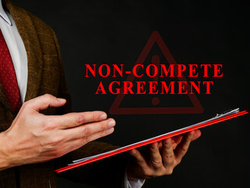
Aug. 30, 2021
Compliance: at the moment

► An article from March 3, 2021, Smile for the camera: the dark side of China's emotion-recognition tech, then an article from June 16, 2021, "Every smile you fake" - an AI emotion - recognition system can assess how "happy" China's workers are in the office describes how a new technology of emotional recognition is able, through what will soon be out of fashion to call "facial recognition", to distinguish a smile that reflects a mind state of real satisfaction from a smile which does not correspond to it. This allows the employer to measure the suitability of the human being for his or her work. It is promised that it will be used in an ethical way, to improve well-being at work. But isn't it in itself that this technology is incompatible with any compensation through ethical support?
The technology developed by a Chinese technology company and acquired by other Chinese companies with many employees, allows to have information on the actual state of mind of the person through and beyond his or her facial expressions and bodily behavior.
Previously, the technology of emotional recognition had been developed to ensure security, by fighting against people with hostile plans, public authorities using it for example in the controls at airports to detect the criminal plans which some passengers could have.
It is now affirmed that it is not about fighting against some evil people ("dangerousness") to protect the group before the act is committed ("social defense”) but that it is about helping all workers.
Indeed, the use that will be made of it will be ethical, because first the people who work for these Chinese companies with global activity, like Huawaï, do it freely and have accepted the operation of these artificial intelligence tools (which is not the case with people who travel, control being then a kind of necessary evil that they do not have to accept, which is imposed on them for the protection of the group), but even and above all, the purpose is itself ethical: if it turns out that the person does not feel well at work, that they are not happy there, even before they are perhaps aware, the company can assist.
Let’s take this practical case from the perspective of Law and let’s imagine that it is contested before a judge applying the principles of Western Law.
Would this be acceptable?
No, and for three reasons.
1. An "ethical use" cannot justify an unethical process in itself
2. The first freedoms are negative
3. "Consent" should not be the only principle governing the technological and digital space
I. AN "ETHICAL USE" CAN NEVER LEGITIMATE AN UNETHICAL PROCESS IN ITSELF
These unethical processes in themselves cannot be made "acceptable" by an "ethical use" which will be made of them.
This principle was especially reminded by Sylviane Agacinski in bioethics: if one cannot dispose of another through a disposition of his or her body which makes his or her very person available (see not. Agacinski, S., ➡️📗Le tiers-corps. Réflexions sur le don d’organes, 2018).
Except to make the person reduced to the thing that his or her body is, which is not ethically admissible in itself, that is excluded, and Law is there in order to this is not possible.
This is even why the legal notion of "person", which is not a notion that goes without saying, which is a notion built by Western thought, acts as a bulwark so that human beings cannot be fully available to others, for example by placing their bodies on the market (see Frison-Roche, M.-A., ➡️📝To protect human beings, the ethical imperative of the legal notion of person, 2018). This is why, for example, as Sylviane Agacinski emphasizes, there is no ethical slavery (a slave who cannot be beaten, who must be well fed, etc.).
That the human being agrees ("and what about if it pleases me to be beaten?") does not change anything.
II. THE FIRST FREEDOM IS THE ONE TO SAY NO, FOR EXAMPLE BY REFUSING TO REVEAL YOUR EMOTIONS: FOR EXAMPLE HIDING IF YOU ARE HAPPY OR NOT TO WORK
The first freedom is not positive (being free to say Yes); it is negative (being free to say No). For example, the freedom of marriage is having the freedom not to marry before having the freedom to marry: if one does not have the freedom not to marry, then the freedom to marry loses any value. Likewise, the freedom to contract implies the freedom not to contract, etc.
Thus, freedom in the company can take the form of freedom of speech, which allows people, according to procedures established by Law, to express their emotions, for example their anger or their disapproval, through the strike.
But this freedom of speech, which is a positive freedom, has no value unless the worker has the fundamental freedom not to express his or her emotions. For example if he or she is not happy with his or her job, because he or she does not appreciate what he or she does, or he or she does not like the place where he or she works, or he or she does not like people with whom he or she works, his or her freedom of speech demands that he or she have the right not to express it.
If the employer has a tool that allows him or her to obtain information about what the worker likes and dislikes, then the employee loses this first freedom.
In the Western legal order, we must be able to consider that it is at the constitutional level that the infringement is carried out through Law of Persons (on the intimacy between the Law of Persons and the Constitutional Law, see Marais , A., ➡️📕Le Droit des personnes, 2021).
III. CONSENT SHOULD NOT BE THE ONLY PRINCIPLE GOVERNING THE TECHNOLOGICAL AND DIGITAL SPACE
We could consider that the case of the company is different from the case of the controls operated by the State for the monitoring of airports, because in the first case observed people are consenting.
"Consent" is today the central notion, often presented as the future of what everyone wants: the "regulation" of technology, especially when it takes the form of algorithms ("artificial intelligence"), especially in digital space.
"Consent" would allow "ethical use" and could establish the whole (on these issues, see Frison-Roche, M.-A., ➡️📝Having a good behavior in the digital space, 2019).
"Consent" is a notion from which Law is today moving away in Law of Persons, in particular as regards the "consent" given by adolescents on the availability of their body, but not yet on digital.
No doubt because in Contract Law, "consent" is almost synonymous with "free will", whereas they must be distinguished (see Frison-Roche, M.-A., ➡️📝Remarques sur la distinction entre la volonté et le consentement en Droit des contrats, 1995).
But we see through this case, which precisely takes place in China, that "consent" is in Law as elsewhere a sign of submission. It is only in a probative way that it can constitute proof of a free will; this proof must not turn into an irrebuttable presumption.
The Data Regulatory Authorities (for example in France the CNIL) seek to reconstitute this probative link between "consent" and "freedom to say No" so that technology does not allow by "mechanical consents", cut off from any connection with the principle of freedom which protects human beings, from dispossessing themselves (see Frison-Roche, M.-A., Yes to the principle of will, No to pure consents, 2018).
The more the notion of consent will be peripheral, the more human beings will be able to be active and protected.
________
March 20, 2021
Compliance: at the moment

May 28, 2020
Publications
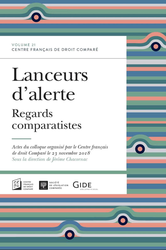
Full reference: Frison-Roche, M.-A., L'impossible unicité juridique de la catégorie des "lanceurs d'alertes" ("The impossible legal unicity of the category of "whistleblowers""), in Chacornac, J. (dir.), Lanceurs d'alertes, regards comparatistes, ("Whistleblowers, comparative perspectives"), Publications of the Centre français de droit comparé ("French Comparative Law Center"), May 2020, Volume 21, p.13-31.
Read the article (in French).
Read the general presentation of the collective book in which this article is published
Read the bilingual working paper which had served of basis for this article.
Read the presentation of the conference "Les lanceurs d'alertes: glose" (Whistleblowers: glose") and especially the slides elabored for the colloquium organized by the Centre français de droit comparé ("French Comparative Law Center") on 23th of November 2018 under the direction of Jérôme Chacornac
____
Introduction of the article
"Whistleblowers". This is a new expression. Which is a great success. Barely heard once, we hear it everywhere ...
A topic not of course or knowledge test, but rather a topic of daily conversation. Because it is spoken to us every day, in more or less gracious terms. For example President Donald Trump on October 1, 2019 declared to the press "want to question" the whistleblower who would have illegally denounced him and would not, according to him, have the right to conceal his identity, proof in this according to him of the lying character of his assertions against him, while his lawyer indicates on October 6, 2019 that he is not speaking on behalf of a single whistleblower thus taken to task but of a plurality of people who gave information against the President of the United States. Even the most imaginative screenwriters would not have written such brutal and rapid twists and turns. Spectators, we are waiting for the next episode, secretly hoping for the escalation.
And precisely if we go to the cinema, it is still a whistleblower whose dedication and success, we are told about, even the drama, for the benefit of global society, and in particular democracy, since the secrets are fought for the benefit of the truth. The Secret Man designates Mark Felt as the first whistleblower. Returning to what we often present as being a more "serious" media!footnote-1391, we listen to France-Culture and here is another story told by a historian who worked as an archivist on events that political power would have liked to keep hidden by possibly destroying their traces but which its trade led to preserve: here it is expressly presented to the studious listeners like a "whistleblower" .... While the same radio tries to find the one who could well be, as in a kind of contest the "first whistleblower"!footnote-1727? .... This rewriting of History can be defended because ultimately what did other Voltaire do for Calas, or Zola for Dreyfus?
It is also a subject of legislative discussion since in the United States the Dodd-Frank law of 2010 inserted in the law of 1934 which established the Securities & Exchanges Commission a complete device of remuneration and remuneration of the whistleblowers, whereas after having developed flexible but guiding lines in this regard in 2012!footnote-1698, the European Commission published on November 20, 2018 the text of what will become a Directive intended to give a unified European status to the character, in the system gradually developed to protect the one who was presented in 2018 as that "cannot be punished for having done what is right".
In Europe, the Directive first approved by a Resolution of the European Parliament on April 16, 2019 on the protection of persons denouncing breaches of Union Law and then adopted on October 7, 2019 (Directive of the European Parliament and of the Council of European Union on the Protection of Persons who Report Violations of European Union Law, different title, it should be noted, will have to be transposed into the laws of the Member States within the next two years. , since only "violations of Union Law" are targeted, but the character of the "whistleblower" is more generally targeted: he is "whole"!footnote-1699.
In short, the whistleblower is a star!footnote-1390. A sort of historical figure, covered in blows and glory, going from Voltaire to Snowden, both of whom find themselves embodied on the screens!footnote-1681 ....,
Consecrated by law, which associates with it a legal regime of protection to such an extent that, like a Nessus tunic, it is this legal regime which will define the character and not the reverse. When we read the law of December 9, 2016 relating to transparency in the fight against corruption and the modernization of economic life, known as "Sapin 2", we notice that the Legislator makes much of this character, since 'he dedicates its chapter II to him!footnote-1682: "From the protection of whistleblowers", and that it is by his very protection that he formally opens the door of Right to him.
But why a plural? Admittedly when we read the recitals of the Community Directive of October 7, 2019 on the protection of whistleblowers!footnote-1702, it is only a list of all the subjects on which it is a good idea to protect them, which therefore prompts us to see in this plural only the index of this non-exhaustive list of subjects which it is good to tell us, a sign of the lack of definition of who should alert us. Reading the French law known as "Sapin 2" makes it less severe but more perplexing. Indeed, this plurality referred to by the title of the chapter devoted to "whistleblowers", there is no longer any question in the rest of the law, in the very definition which follows, article 6 which opens this chapter devoted to "whistleblowers" offering the reader immediately a singular since it begins as follows: "A!footnote-1684 whistleblower is a person ...". No mention of diversity. The art of legislative writing would however have required that the qualifying article not only be singular but that it should not yet be undefined. Stendhal if he had still deigned to have the law for bedside book would have wanted to find at the beginning of chapter a sentence like: "The!footnote-1683 whistleblower is a person ...".
Thus seem to contradict themselves within the law "Sapin 2 the very title which presents the character, in that it uses a defined plural (the) while the defining article which presents it is in the undefined singular (one). ...
Here is a first reason not to advance any more but in a very careful way, in this "step by step" that constitutes a reading word for word: a gloss. This consists of taking the expression itself literally. The second reason for this technical choice is that the gloss is well suited to the introduction of a collective work, thus allowing more targeted developments to take place in other contributions, on the techniques, the difficulties and the limits of this protection, or on its history, or the reasons for the arrival in French law of these whistleblowers and the way they develop, or not, elsewhere.
I am therefore going to content myself with taking this already legal expression to the letter: The (I) whistle (III). blowers (II).
Jan. 5, 2020
Thesaurus : Doctrine
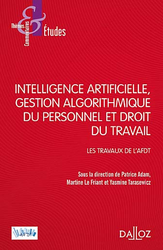
Full reference: Adam, P., Le Friant, M. et Tarasewicz, Y. (ed.), Intelligence artificielle, gestion algorithmique du personnel et droit du travail (written in French), serie "Les travaux de l'AFDT", Coll. "Thèmes et Commentaires", Dalloz, 2020, 241p.

Updated: Oct. 8, 2019 (Initial publication: Nov. 22, 2018)
Publications

This working paper served as a basis for a conference done in French for the Centre de droit comparé (Center for Comparative Law) in Paris on 23 November 2018.
Updated, it has served as a basis for an article published in French in a book of the Société de Législation comparé (Society of Comparative Legislation).
________
"The whistleblowers". This is a new expression. Which wins a full success. Barely heard once, we hear it everywhere ...
A theme not only of academic teaching, but rather a topic of daily conversation. Because it is every day that we speak about it, in terms more or less graceful. For example President Donald Trump on October 1, 2019 told the press he "wants to interrogate" the whistleblower who would have unlawfully denounced him and would not have, according to him, the right to conceal his own identity, evidence in this according Donald Trump of the false character of his assertions against him, while his lawyer indicates on October 6, 2019 that he does not speak on behalf of a single whistleblower thus taken apart but of a plurality people who gave information against the President of the United States. Even the most imaginative scriptwriters would not have written twists as abruptly or so fast. Spectators, we wait for the next episode, secretly hoping for climbs and slashs.
Precisely if we go to the cinema, it is still a whistleblower whose dedication and success, or even drama, we are told, for the benefit of the global society, and especially of Democracy, since the secrets are fought for the benefit of the truth. Thus, the movie The Secret Man designates Mark Felt as the first whistleblower. Returning to what is often presented as a more "serious" media, for example in France the radio "France Culture" we can learn the story of a historian who worked as an archivist on events that the political power would have wanted to keep hidden by possibly destroying their traces but that his profession led to preserve
It is also a topic of legislative debate since in the United States the Dodd-Frank Act of 2010 inserted in the 1934 law that established the Securities & Exchanges Commission (SEC) a complete system for retribution and remuneration of whistleblowers, while after elaborating guidelines about about in 2012
In Europe, the Directive first approved by a Resolution of the European Parliament on 16 April 2019 on protection of persons reporting breaches of Union law and then adopted on 7 October 2019 (Directive 2019/78 (EU) of the European Parliament European Union and the Council of the European Union on the Protection of Persons Reporting Breaches of Union law, will have to be transposed in the next two years to the legal systems of the Member States. is not general, since only "violations of European Union Law" are targeted but the character of the "whistleblower" is more generally referred to: it is "whole"
In short, the whistleblower is a star
Recognized by national legislations, which associate to him a legal regime of protection to such a point that, like a tunic of Nessus, it is this legal regime which will define his character and not the opposite. When we read the French law of December 9, 2016 relative à la transparence à la lutte contre la corruption et à la modernisation de la vie économique (on transparency in the fight against corruption and the modernization of economic life), usually known as "Sapin 2 Act", we note that the lawmaker makes much of this character, because he devotes to him the chapter II: "De la protection des
But why a plural? Certainly when we read the recitals of the European Directive of 7 October 2019 on the protection of whistleblowers
Thus seem to contradict in this law "Sapin 2" itself the very title which presents the character, in that it uses a definite plural ("the whistleblowers") while the article of definition which presents the topic does it by using the singular indefinite : "a whistleblower....".
This is a first reason to move forward only in a very cautious way, in this "step by step" that constitutes a word-by-word reading: a gloss. This method consists in taking literally the expression itself. The second reason for this technical choice is that the gloss is well suited to an introduction of a collective work, allowing more specific developments to take place in other contributions, for example on the techniques, the difficulties and the limits of this protection, or the history of it, or the reasons for the arrival in French law of these American or Brithish whistleblowers and the way they develop, or not, in other legal systems or other countries.
I will therefore content myself with taking again literally this already legal expression: The (I) launchers (II) of alert (III).
See below developments.
On the more general fact that cinema is undoubtedly the medium which most seriously restores the state of the Law, c. Frison-Roche, M.-A., Au coeur du Droit, du cinéma et de la famille : la vie, 2016.
L'histoire du premier lanceur d'alerte, France Culture, septembre 2019.
European Commission, Guidelines on Whistleblowing, 6 of December 2012, SEC(2012) 679 final, updated on 23 of April 2018.
However, precisely the so common use of plurality ("whistleblowers") raises doubts about the uniqueness of the character. On this question, see. all the first part of the developments of this study, which leads to the conclusion rather than beyond the multitude of particular cases, there are rather two kinds of whistleblowers. V. infra I.
The director of the film La fille de Brest says that she considers the whistleblower at the origin of the case of the Pick as a "movie character".
Thus, the adventures of Snowden were brought to the screen by Oliver Stone in 2016, Snowden. On the question of knowing whether this film "faithfully reproduces" or not the case, Schetizer, P., Le film Snowden est-il à la hauteur de la réalité?, 2017. This article is favorable to the whistleblower, and to the film which tells us with emotion his case, in particular because (sic), it is easier than to read the Washington Post.
Underlined by us.
Underlined by us.
About this directive, v. the developments infra
Underlined by us.
June 10, 2019
Thesaurus
Référence complète : Menger, P.-M., Comment achever une oeuvre ? Travail et processus de création, Cours au Collège de France, 2019.
Nov. 21, 2018
Thesaurus : Doctrine
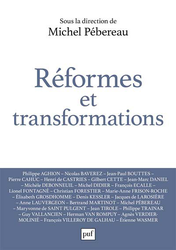
Référence complète : Pébereau, M. (dir.), Réformes et transformations, PUF, novembre 2018, 606 p.
Présentation de l'ouvrage : Un chômage structurel de 9 %, une dette publique approchant 100 % du PIB, une compétitivité déclinante, des déficits commerciaux quasi structurel : depuis trop longtemps, les indices d'un recul des performances économiques de la France s'accumulent, mettant en danger son modèle social et sa place dans le monde. Une réaction paraît s'être produite à la faveur de la dernière élection présidentielle et les premières mesures opérées par le gouvernement d'Emmanuel Macron et d'Édouard Philippe ont fait la preuve que la réforme était possible. Mais le processus qui doit permettre à la France d'affronter sereinement les défis de la mondialisation et des révolutions technologiques est encore long.
Fruit des communications tenues tout au long de l'année 2017 devant l'Académie des sciences morales et politiques, les vingt-six études réunies dans ce volume n'évitent aucun sujet brûlant : droit du travail, fiscalité, retraite, éducation, etc. Rédigées par les meilleurs spécialistes, sans complaisance ni idéologie, elles posent un diagnostic informé sur nos problèmes et proposent des remèdes pour corriger les handicaps les plus criants en anticipant les enjeux à venir.
La France n'est pas dépourvue de forces vives qui ne demandent qu'à servir, une fois libérées des schémas obsolètes dans lesquels nous les tenons enfermées. Aux citoyens de solliciter et soutenir les efforts de transformation nécessaires. Aux hommes politiques de les engager. La seule ambition de cet ouvrage est de les y aider.
Ce cycle de réflexions de l'Académie des sciences morales et politiques sur les réformes et transformations a été proposé et animé par Michel Pébereau, président de l'Académie en 2017.
Consulter la table des matières.
Lire la quatrième de couverture.
Aug. 15, 2018
Thesaurus : Doctrine

Full reference: Musso, P. and Supiot, A. (ed.), Qu'est-ce qu'un régime de travail réellement humain?, collection Société et pensées, Hermann, 2018, 524 p.
This book comes from an intervention given on 25th of September 2014 at Paris-Dauphine University.
Feb. 1, 2018
Blog
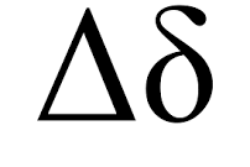
- "Affaire Alexia Daval : une volte-face caméra"
- "Chibanis discriminés : la justice passe, la SNCF devra payer"
- "Lactalis "ne peut exclure" que des bébés aient consommé du lait contaminé entre 2005 et 2017
- "Violences faites aux femmes ou terrorisme : des procès sous pression"
- "La défenses de Jonathann Daval provoque un tollé"
Cela fait longtemps que l'on parle beaucoup de Droit. Les faits divers ont toujours passionnés. La sociologie a toujours regardé cette façon que le "grand public" a regardé cette représentation que la presse lui donne du Droit. L'affaire des sœurs Papin, qui intéressa aussi Lacan, étant sans doute le plus bel exemple.
Cela fait longtemps aussi que l'on observe dans les médias grand public une appréhension du Droit à travers les procès, alors que non seulement les procès ne sont qu'une partie du Droit, mais encore certains affirment qu'ils ne sont que la partie pathologique du Droit.
Ce qui est remarquable ici, c'est le fait que la plus grande partie de l'actualité du jour concerne le Droit (car l'information sur Lactalis est une information précontentieuse).
Quelles conséquences en tirer ?
Il convient d'apprendre le droit technique aux lecteurs des journaux, c'est-à-dire au "grand public", le Droit (par exemple le droit public, le droit de la responsabilité, le droit de la sécurité des produit, le droit du travail, pour prendre ceux correspondant à cette actualité du jour).
Or, si l'économie fait partie des programmes des lycées, le Droit en est absent. Alors même qu'on explique, à juste titre, qu'on doit inculquer davantage de sciences économiques.
Mais le Droit est une matière qui n'est pas enseignée du tout, sauf dans l'enseignement supérieur spécialisé.
Or, cela intéresse toute la population.Comme le montrent les titres d'un quotidien grand public.
Ne convient-il pas de rapprocher les deux faits, et d'en tirer des conséquences ?
La principale est la nécessité de donner à chacun les moyens de comprendre ces informations juridiques, parce que non seulement c'est important mais aussi parce que cela intéresse chacun (c'est donc un "intérêt aux deux sens du terme).
D'en trouver les voies et les moyens.
_____
April 21, 2017
Blog

Through the Open Culture website, it is possible to listen to Hayao Miyazaki who, in March 2017, claimed that video games whose drawings are made on Artificial Intelligence basis are "insults to life".
Read below the history, the words that the Master has held, his conception of what is creation and "truly human" work, which is echoed by the definitions given by Alain Supiot, who also reflected on what robots do.
This brings us back to the very notion of "creation" and creative work.
_____
Read below
Oct. 20, 2016
Thesaurus : Doctrine
Référence complète : Gamet, L., Droits de l'homme, urbi et orbi, Droit social, 2016, p. 1046 et s.
Résumé de l'article (par l'auteur) : Une fois affirmée l'universalité des droits de l'homme au travail, se pose la question de leur effectivité. Aucun tribunal international n'ayant été institué pour condamner un État défaillant, comment faire pour que les droits de l'homme au travail soient respectés de par le monde, sans consacrer un droit d'ingérence dans les affaires nationales des États souverains ? L'initiative publique trouve aujourd'hui, de façon subtile, un puissant relais dans l'initiative privée.
Oct. 11, 2016
Thesaurus
Référence complète : Martineau-Bourgnineaud, V., La légalisation de la responsabilité sociale des entreprises (RSE) au service du dialogue social : idéologie ou utopie ? , Petites Affiches, 11 octobre 2016, p.6-11.
L'auteur relève que l'expression de "responsabilité sociale de l'entreprise" est peu définie. La Commission Européenne y voit la "responsabilité des entreprises vis-à-vis des effets qu'elles exercent sur la société", les salariés faisant partie de ses "parties prenantes", et la norme ISO 26000 de 2010 sur la gouvernance intégrant les relations de travail.
La RSE a pénétré le Droit par la loi de 2001 sur les "nouvelles régulations économiques", tandis que la loi de 2010 réformant le droit des sociétés cotées et important le principe "appliquer ou expliquer" oblige à inclure dans le rapport annuel de gestion des données sociales et environnementales. En cela ce rapport RSE promeut le dialogue social.
L'auteur pose donc que "cette nouvelle idéologie" est entrée dans le Droit.
Cette "consécration d'une idéologie" consiste à "créer un cadre réglementaire qui place l'homme au cœur des préoccupations de l'entreprise", en changeant pour cela sa gouvernance. En obligeant à la diversité dans les conseils d'administration, notamment leur féminisation et la présence des salariés. Le dialogue social prend la forme aussi de la participation des institutions représentatives du personnel dans le "reporting social et environnemental" et leur participation sur la stratégie de l'entreprise, puisque les discussions à ce propos prennent pour base les reportings précités. On constate cependant que les comités d'entreprise sont peu associés.
C'est sans doute pour cela que l'auteur considère que la RSE comme dialogue social relève plutôt d'une "utopie"...
Le dialogue social participe pourtant de la performance économique de l'entreprise et la loi dite Rebsamen du 17 août 2015 s'en prévaut, la loi du 8 août 2016, dite El Khomri inclut dans la "base de données économiques et sociales" et le taux de féminisation des conseils d'administration et le nombre d'accords collectifs.
Mais l'auteur estime qu'à mettre dans le dialogue social des éléments qui n'en relèvent pas - comme l'environnement ou le sociétal - on affaiblit le dialogue social.
L'auteur conclut son article d'une façon très critique en ces termes :
"La RSE à l'épreuve du droit nus enseigne que l'élément matériel de la RSE, les obligations légales (reporting, diversité des conseils d'administration, régle complain or explain...), et l'élément psychologique, son caractère volontaire impulsé par les dirigeants de l'entreprise sont indissociables. Alors que la RSE entend mettre l'humain au coeur des préoccupations de l'entreprise, on constate qu'il y a complète dissociation entre le discours affiché et la réalité économique et sociale. ..... cette RSE légalisée devient un instrument sophistique au service de ce but exclusif en permettant aux entreprises de se draper de vertus dans le but d'acheter la paix sociale, les conflits sociaux étant l'ennemi juré de la productivité.".
Les étudiants de Sciences po peuvent lire l'article en accédant via le drive au dossier "MAFR - Régulation"
April 14, 2016
Thesaurus : Doctrine
Référence complète : Danis-Fatôme, A., "Le dispositif propre à la charge de la preuve, frein ou outil de lutte contre les discriminations ?", Revue des droits de l’homme, 2016, n°9.
____
March 10, 2016
Thesaurus : Doctrine
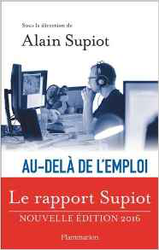
Référence complète : Supiot, A., Les voies d'une vraie réforme du droit du travail, in Supiot, A. (dir.) "Au-delà de l'emploi"Au-delà de l'emploi, Flammarion, nouvelle édition 2016, p.II-XLVII.
Les étudiants de Sciences po peuvent lire l'article d'Alain Supiot en accédant via le drive au dossier "MAFR-Régulation.
March 10, 2016
Thesaurus : Doctrine

Référence complète : Supiot, A. (dir.), Au-delà de l'emploi, Flammarion, nouvelle édition 2016, 316 p.
Lire la préface d'Alain Supiot à la seconde édition : Les voies d'une vraie réforme du droit du travail.